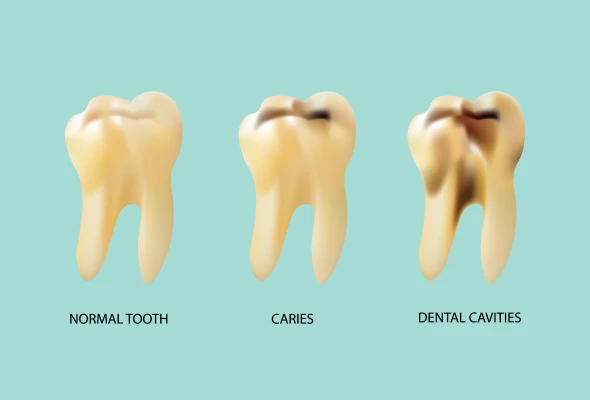-
Doctors
-
Specialities & Treatments
Centre of Excellence
Specialties
Treatments and Procedures
Hospitals & Directions HyderabadCARE Hospitals, Banjara Hills CARE Outpatient Centre, Banjara Hills CARE Hospitals, HITEC City CARE Hospitals, Nampally Gurunanak CARE Hospitals, Musheerabad CARE Hospitals Outpatient Centre, HITEC City CARE Hospitals, Malakpet
HyderabadCARE Hospitals, Banjara Hills CARE Outpatient Centre, Banjara Hills CARE Hospitals, HITEC City CARE Hospitals, Nampally Gurunanak CARE Hospitals, Musheerabad CARE Hospitals Outpatient Centre, HITEC City CARE Hospitals, Malakpet Raipur
Raipur
 Bhubaneswar
Bhubaneswar Visakhapatnam
Visakhapatnam
 Nagpur
Nagpur
 Indore
Indore
 Chh. Sambhajinagar
Chh. SambhajinagarClinics & Medical Centers
Book an AppointmentContact Us
Online Lab Reports
Book an Appointment
Consult Super-Specialist Doctors at CARE Hospitals

Cavities
Symptom, Causes, Diagnosis and Treatment
Cavities (Tooth Decay)
Have you ever winced at the sharp pain when biting into your favourite sweet treat? Cavities are a common dental ailment that affects people of all ages. They occur when tooth decay damages the hard surface of your teeth, leading to tiny holes. Understanding tooth cavities is crucial for maintaining good oral health and preventing serious dental issues. This article explores the world of dental cavities, from their causes to dental cavity treatment options.

Symptoms of Cavities
Cavities often develop silently, with no noticeable symptoms in the early stages. As tooth decay progresses beyond the enamel into the dentin and pulp, individuals may experience various signs, such as:
- Tooth Sensitivity: One of the initial symptoms of cavities is increased sensitivity to temperature changes. People may feel discomfort or pain when consuming hot or cold foods and drinks.
- Pain and Discomfort: Individuals often experience toothache due to cavities. Sometimes, a tooth cavity may cause generalised oral pain.
- Visible Changes: Visual signs of cavities include:
- Black or brown staining
- Small pits or notable holes in the teeth
- Facial Swelling
- Bad breath (halitosis)
- An unpleasant taste in the mouth
- Apart from temperature sensitivity, lingering discomfort after consuming sweet foods or drinks can signal the presence of cavities.
- Sometimes, bleeding gums or other signs of gum disease may accompany cavities.
Cavities Causes
Cavities develop when acids in the mouth wear down the tooth's hard outer layer (enamel). This process, called tooth decay, occurs over time and involves several factors working together:
Plaque: Consuming sugary and starchy foods and drinks causes the accumulation of dental plaque on teeth. Long-term plaque accumulation may trigger bacteria to damage tooth structure and initiate cavities due to food
Sugar-rich Diet: The bacteria residing in the cavity in the mouth feed on sugary and starchy foods such as fruit, candy, bread, cereal, sodas, juice, and milk. They convert carbohydrates into acids, which bind with food particles and saliva to cause dental cavities.
Poor Oral Hygiene: Not brushing and flossing regularly may cause plaque buildup and bacteria accumulation, which may erode tooth enamel and result in cavities.
Frequent Munching: Regular snacking, especially on sugary or acidic foods, does not give our teeth the time they need to heal and trigger the tooth cavity process.
Worn Dental Filling and Ill-fitting Dental Device: Worn cavity dental fillings allow plaque to build up more easily and make removing it harder, promoting cavities. Similarly, ill-fitting dental devices allow decay to begin under them.
Eating Disorder: Eating disorders (anorexia and bulimia) can be a causative factor in a lot of tooth erosion and dental cavities. Gastric acid from repeated vomiting washes over the teeth and erodes the enamel, resulting in tooth cavities.
Risk Factors of Dental Cavities
Several factors can increase the possibility of developing cavities:
- Back teeth, such as molars and premolars, have a higher risk of developing cavities. These teeth have numerous grooves, pits, and multiple roots that collect food particles, making them harder to clean than the smoother front teeth.
- Dry mouth (xerostomia)
- Frequent consumption of sugary or starchy food products and drinks
- Family history of dental decay
- Gum recession
- History of radiation therapy to treat head and neck cancer
Complications
Untreated cavities can lead to severe consequences that extend beyond mere toothache, such as:
- Severe pain and discomfort
- Dental abscess
- Gum diseases
- Structural damage to teeth
- Headache
- Chewing difficulties and nutritional problems
- Positioning shifts of the nearby teeth
- Front teeth cavities are more noticeable, affecting smile and confidence
Diagnosis
Detecting cavities involves a combination of visual examination and advanced diagnostic tools:
Visual Examination: Dentists look for discoloured spots on the teeth, which may appear whiter or darker than the surrounding enamel.
Tactile Examination: Dentists use special dental tools to feel for soft spots or holes in the teeth.
Radiographic Imaging: Dental X-rays are crucial in detecting cavities, especially in areas not easily visible during a visual examination.
Advanced Diagnostic Technologies: These enable dentists to detect cavities at earlier stages and monitor the effectiveness of preventive treatments:
- Fibre-optic transillumination (FOTI)
- Fluorescence-based devices
- Electrical conductance
- Devices like PTR-LUM and laser fluorescence
- Intra oral scanners
Treatment
The treatment for dental cavities depends on the severity of tooth decay.
Fluoride Treatments: Fluoride treatments can repair damaged enamel through remineralisation in the early stages of tooth decay, potentially reversing early signs of cavities.
Dental Fillings: A dental cavity filling procedure becomes necessary once a cavity has progressed beyond the enamel. Common filling materials include:
- Composite resin (tooth-coloured)
- Silver amalgam
- GIC (glass ionomer cement)
Crowns: A crown is a custom-fitted covering or "cap" placed over the tooth to protect & strengthen it. In cases where a large cavity has damaged a substantial portion of the tooth, doctors may suggest a dental crown, onlay and crown lay
Root Canal Therapy: Root canal therapy may be required when tooth decay reaches the pulp (inner material of the tooth).
Tooth Extraction: In severe cases where other treatments are not possible, tooth extraction may be the only option.
When to See a Dentist
Certain cavities symptoms warrant immediate attention from a dentist, such as:
- Experiencing discomfort or pain when consuming hot, cold, or sweet foods and drinks
- Ongoing pain in one or more teeth
- Inflammation in or around the mouth
- Bleeding gums, especially when brushing or flossing
- Discomfort or pain while eating
- Fever or pus around a tooth
- Swollen face
- Changes in gums or teeth
How to Prevent Cavities
Preventing dental cavities is a crucial step for maintaining good oral health. Individuals can significantly lower their risk of tooth decay by adopting a few simple habits and making lifestyle changes, including:
Maintain Good Oral Hygiene:
- Brushing teeth twice daily with fluoride toothpaste
- Flossing at least once a day helps remove plaque and food particles stuck between teeth
Diet and Lifestyle Changes:
- Limit sugary snacks between meals
- Avoid adding sugar to tea or coffee
- Consume sweet treats during mealtimes rather than as separate snacks
- Choose tap water over soft drinks or juice
- Using fluoride-containing toothpaste and drinking fluoridated tap water to incorporate fluoride into one's daily routine.
Additional Preventive Measures:
- Chew sugar-free gum after meals. This may increase saliva flow
- Stay well-hydrated by drinking 6-8 glasses of fluids daily
- Consider dental sealants for deep grooves on teeth if recommended by a dentist.
- Rinse your mouth with water after having sugary foods or drinks if immediate brushing isn't possible.
Natural Tooth Cavity Treatment
While professional dental care remains essential for treating cavities, several natural remedies may help prevent tooth decay and support oral health.
- Oil Pulling: This ancient Ayurvedic practice includes swishing with oil (sesame or coconut oil) in your mouth for about twenty minutes.
- Aloe Vera Tooth Gel: Its antibacterial properties may help reduce dental cavities by preventing the buildup of harmful bacteria in the mouth.
- Vitamin D and Minerals: Adequate intake of Vitamin D, minerals like calcium, phosphorus, and magnesium is crucial for maintaining healthy teeth.
- Liquorice Root: Liquorice root has antibacterial properties that target Streptococcus mutans.
- Sugar-free Gum: Chewing sugar-free gum after having food has been shown to reduce levels of enamel-damaging bacteria.
- Fluoride: High-fluoride toothpaste or direct fluoride application helps remineralise tooth enamel.
Conclusion
Good oral health is essential for preventing cavities and ensuring overall well-being. Regular oral check-ups, proper brushing and flossing techniques with a healthy diet plan play an important role in keeping teeth healthy. Natural remedies can complement these practices, offering additional support to teeth and gums.
FAQ's
1. Do you get rid of cavities?
Cavities, or tooth decay, are small holes in teeth that cannot be naturally removed at home. Only a dentist can fill a cavity.
2. How do I stop my cavities?
One should focus on good oral hygiene and dietary habits to stop cavities from progressing. Here are some effective methods:
- Brush teeth at least twice a day, focusing on the cavity area to remove food particles
- Use fluoride toothpaste
- Chew sugar-free gum containing xylitol after meals
- Floss your teeth daily to remove food debris and plaque between teeth
- Rinse with water after every meal
- Avoid sugary foods and beverages
- Consume a diet enriched in minerals like calcium, phosphorus, and magnesium
- Ensure adequate vitamin D intake
3. Should you brush a cavity?
Yes, one should continue brushing their teeth even if they have a cavity, as thorough brushing can help hinder the cavity's progression.
4. How to fill a tooth cavity naturally?
While it's not possible to fill a tooth cavity naturally at home, some natural remedies may help slow the progression of early-stage cavities and support overall dental health.
5. How common are cavities?
Cavities are extremely common conditions. In a study in India, the overall prevalence of dental caries was 54.16%, with 62% in patients above 18 years of age and 52% among 3-18 years of age.
Still Have a Question?




